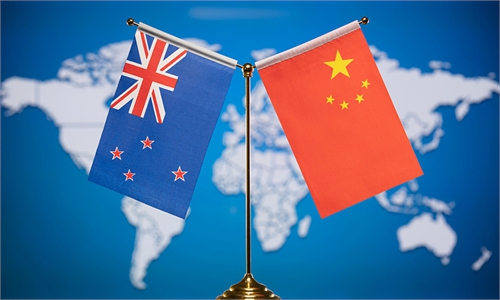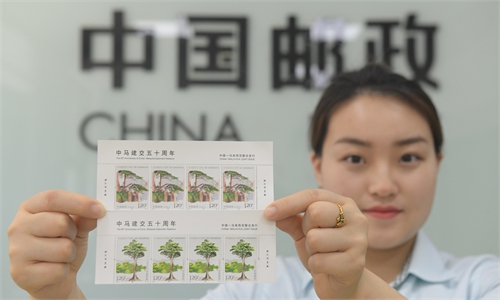China-Malaysia economic, trade ties to expand amid high-level visit, with cooperation under BRI a highlight
Official, businesspeople anticipate greater synergy under BRI cooperation

People perform Chinese dragon dance in Kuala Lumpur, Malaysia on January 18, 2024. Photo: VCG
Chinese Premier Li Qiang arrived in Malaysia on Tuesday for an official visit, marking the third and last leg of his eight-day tour, which has also taken him to New Zealand and Australia, the Xinhua News Agency reported. This visit has garnered wide attention, with a Malaysian official and business representatives expressing their anticipation and optimism for enhanced synergy as bilateral economic and trade ties are getting closer than ever.
The high-level visit, occurring as the two countries commemorate the 50th anniversary of diplomatic relations, is anticipated to provide fresh momentum to bilateral ties, particularly in economic and trade relations, highlighted by the fruitful results of cooperation under China's Belt and Road Initiative (BRI) and the Regional Comprehensive Economic Partnership (RCEP), a Malaysian official and business representatives said.
In meeting with Malaysian Prime Minister Anwar Ibrahim on Wednesday, Li said that China-Malaysia ties are at the forefront among relations between regional countries, and have set a benchmark and an example, the Xinhua News Agency reported.
The Chinese premier's inaugural official visit to Malaysia represents a significant opportunity to enhance bilateral economic and trade relations, Unny Sankar Ravi Sankar, minister of economic affairs of the Malaysian Embassy in Beijing, told the Global Times in an exclusive interview, noting that expectations for the visit to bolster bilateral economic and trade ties are filled with optimism.
"We anticipate discussions on expanding trade, increasing mutual investment and exploring new areas of trade and economic cooperation," Sankar said. Strengthening trade and economic partnerships between the business communities of Malaysia and China is also "imperative" as it can lead to more robust and resilient economic growth for both nations, he added.
Over the years, economic and trade relations between China and Malaysia have been highly complementary. Bilateral trade climbed from less than $200 million when diplomatic relations were established in 1974 to $190.24 billion in 2023, an increase of more than 950 times, according to the Chinese Embassy in Malaysia.
China has been Malaysia's largest trading partner for 15 consecutive years and Malaysia's main source of investment for many consecutive years. Malaysia is China's second-largest trading partner and largest source of imports in ASEAN.
"Malaysia's rich natural resources, advanced manufacturing capabilities, and strategic location align well with China's industrial and consumer demands. This complementarity allows both countries to benefit from increased trade efficiency, supply chain integration and economic synergy," Sankar said.
Malaysia has been a direct beneficiary of the BRI, in which Malaysia was one of the earliest participants. Cooperation under this initiative will be further expanded following the high-level visit.
While meeting with the Malaysian prime minister on Wednesday, Li said that China is willing to work with Malaysia to steadily advance the construction of major projects such as the East Coast Rail Link and the "Two Countries, Twin Parks," the two BRI flagship projects, while expanding the scale of trade and investment, Xinhua reported.
"Malaysia has reaped significant benefits from participating in the BRI. The initiative has facilitated infrastructure development, improved connectivity and attracted substantial Chinese foreign direct investment into Malaysia," Sankar said.
Sankar said that Malaysia is fully confident that the BRI will open up new frontiers of connectivity, and new possibilities for growth and development across the Asia-Pacific, Africa, and Central and Eastern Europe.
The Southeast Asian country was also an early member of the Regional Comprehensive Economic Partnership (RCEP), which took effect in Malaysia in March 2022. Since then, the country has derived huge benefits from the free trade deal. Sankar in particular highlighted China's participation in the RCEP, which he said has been a pivotal development for the Malaysian economy.
The Chinese premier's visit has also sparked high expectations from the Malaysian business community.
Speaking about expectations for the high-level visit and future ties, Loh Wee Keng, chairman of the Malaysian Chamber of Commerce and Industry in China, told the Global Times that as a major export market for Malaysia, it is hoped that China can increase imports of Malaysian palm oil, rubber, petroleum and natural gas, and electronics and electrical products, and also provide more access for agricultural products to enter China.
Malaysia is a tropical country, producing tropical agricultural products that China greatly needs. At the same time, our natural resources such as minerals provide a good resource guarantee for China's rapid development in high-tech sectors, Loh said.
Moreover, Malaysia can serve as a gateway for Chinese products to reach various countries worldwide due to Malaysia's free trade agreements and robust sales channels in multiple countries, Loh said.
The vast Chinese market provides significant space for Malaysian agricultural and electronic products, the chamber head said, noting that Malaysian enterprises should seize the opportunity to grow alongside Chinese companies in the rapidly developing fields of electric vehicles and the digital economy.
Doing so will help Malaysian businesses to become leaders in these economic sectors in the new era, Loh said.



